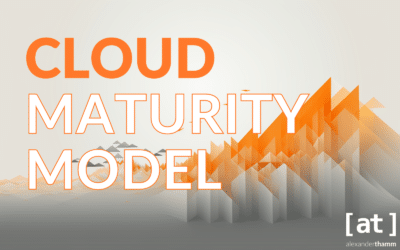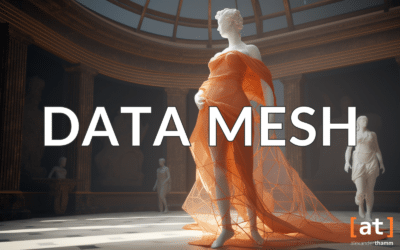In the context of Big Data, there is usually a flood of terms such as Data miningPredictive analytics or machine learning, but also different technologies such as Hadoop, Apache Hive or Apache Spark are mentioned. Alternatively, the topic is discussed against the background of challenges such as data protection and Data security discussed. These and other aspects can be grouped under the term Data governance be summarised.
Especially when it comes to the management and access control of extremely large amounts of data, data governance ensures functioning framework conditions and ensures compliance with standards:
- Quality standards
- Safety standards
- Data collection standards
- Process standards
Data governance is not least the solution to a challenge that we encounter again and again in practice. It is true that many companies have a lot of data. However, not all available data may be used in Data science projects processed. In addition, there is often a lack of descriptive metadata that allows relevant data to be identified for analysis.
Inhaltsverzeichnis
What is data governance?
Neither theory nor practice currently provide a clear definition of data governance. The most general formula to which data governance can be reduced is: the specification of rules to be observed in dealing with a defined data spectrum. Sometimes the term "data governance" is also used in this context. Data Management without there being any major deviations in terms of content. The tasks of data governance or of data management are, in short, the Planning, control and provision of data. Data governance in its original form refers to the distribution of access rights and related tasks in relation to data management in companies.
In addition, data governance ensures that all legal requirements are met., such as the Data protection, are respected. Another important task is to provide the tools necessary to ensure that secure access to the data in the company is possible at all times. Data governance thus serves several purposes:
- Ensure access to data
- Identify and avoid risks
- Recognising and exploiting entrepreneurial potential
- Reduce data storage and management costs
The creation of a data cataloguewhich also regulates these responsibilities, is one of our standard processes.
2. four decision-making and competence areas of data governance
There are therefore four core areaswhich fall under the term data governance:
- Data Quality
- Data Maintenance
- Data Privacy
- Data Compliance
Each of these four areas is always about assigning roles (Data Roles), ensuring compliance with standards and defining processes.
- Data Quality: This is about ensuring that data is recorded completely, that data is up-to-date, suitable for further processing and prepared accordingly, and that access is guaranteed and regulated.
- Data Maintenance: Aims to enrich data, correct data and maintain master data.
- Data Privacy: Ensure that all relevant standards are met in terms of security and confidentiality towards the client.
- Data Compliance: Compliance with legal standards, ethical and moral guidelines and company standards and policies.
3. data governance as a necessary complement to the data lake
Companies that store data in a Data Lake need a well-established strategy for managing the large amounts of data that are stored there. Without the necessary standards for data collection, data storage and data processing, companies with Data Lake run the risk of ending up with a "Data Swamp"(or "data swamp").
Finding and processing relevant data is then only possible with difficulty and the entire system becomes inefficient. But the following also applies beyond the data lake use case: if data is increasingly recognised as an important part of the value chain, it can only be processed in a sensible and economically profitable way ifIf important standards are defined and adhered to. In particular, compliance with the legal framework is crucial if new markets are to be opened up.
4. the advantages of data governance
- Better understanding through common vocabulary
- Time saving through descriptive metadata
- Standardisation of access processes
- More trust in the digital transformation
Data governance brings several benefits that go far beyond simply meeting regulatory requirements. First, a common vocabulary of business terms enables analysts to find the relevant data for their use cases without unnecessary detours. Second, descriptive metadata saves staff valuable time in understanding data sources. Thirdly, access processes are standardised and data protection regulations are complied with through automatic anonymisation, clear regulations and implementation of access rights. And lastly, fourthly, employees and customers gain more trust in the process of digital transformation because there are clear guidelines for assessing and complying with standards and regulations in data processing.
5. data governance: an integral part of data strategies
Data governance is an integral part of successful data science strategies. It ensures that data quality increases measurably through compliance with standards. At the same time, it ensures that data processing processes are optimised. It is not a pure IT task, but is located at the interface of several areas.
Moreover, it is not a single task or a singular project that has to be carried out once. Data governance is rather a permanent process - Many companies therefore appoint a data governance officer or - depending on the size of the company - institutionalise the task as a department. The primary goal of data governance is to Preservation and enrichment of in-house knowledge and maintaining standards in its strategic use.
6. use cases of Alexander Thamm GmbH
Data governance model in reinsurance
An international reinsurance client of Alexander Thamm GmbH had the goal of introducing a strategy for digitalisation in the company from its existing data. The challenge was to create clear structures and processes for group-wide data governance with old and new data sources, as well as internal and external data. Through a clear definition of responsibilities and cooperation with all departments, the necessary processes for data architecture, data quality and data maintenance were successfully implemented. You can find more on this in our use case on Data governance in reinsurance.
DG Model for a car manufacturer
An automotive company wanted to drive the transformation to a data-driven organisation. The challenge was that Data Science Use Cases could not be implemented due to a lack of processes and responsibilities. Lack of data access processes, poor data quality and Different naming conventions were also key hurdles. Our experts designed and implemented transparent workflows to regulate data access, problem management and other essential processes.
In addition, clear roles and responsibilities were defined.
which can be assigned to suitable users. The preparation of suitable data models for the metadata databases Business-Glossary, Data-Dictionary, Data-Projects-Glossary was also part of the solution approach.
Alexander Thamm GmbH thus developed a standardised access process by automatically anonymising newly registered data objects. A common vocabulary of business terms now enables analysts to find the relevant data for their use cases without detours.
7. 7 steps to implementation
- Development of a clear data structure based on a tested template to identify the data quality and usage scenarios of the data catalogue.
- Elaboration of important insights and the actual benefits of the data catalogue.
- Derivation of required processes and recognisable benefit arguments in a common Workshop. The experiences of the first steps are also discussed here.
- Another workshop provides knowledge on the requirements for a data governance strategy and looks at initial approaches to solutions for your company.
- With the experience gained in creating the data catalogue and the workshop results, the basis for a data strategy is given and a roadmap can be created.
- Launch of a pilot project
- Evaluate the results of the pilot project and derive an initial estimate of the scope and effort required for data governance and the associated changes in the company.
Our offers and services in the area of data governance
Data governance is a comprehensive and sometimes very complex topic. At the latest since the revision of the EU Data Protection Regulation, we have been increasingly teaching this topic in order to further promote awareness of data protection and data security in management. We support companies in the selection of suitable tools such as Informatica, Collibra or Azure in order to implement the required structures and processes. Since data governance is a important aspect of the digital transformation In addition, we see ourselves as an enabler for the development of suitable processes and roles throughout the company. This can be done both within the framework of a Workshops or in the case of accompaniment over a longer period of time. The exact duration of the accompaniment depends on the size and structure of the respective organisation.
Are you ready for the introduction of data governance? Then talk to us. We will help you!










0 Kommentare